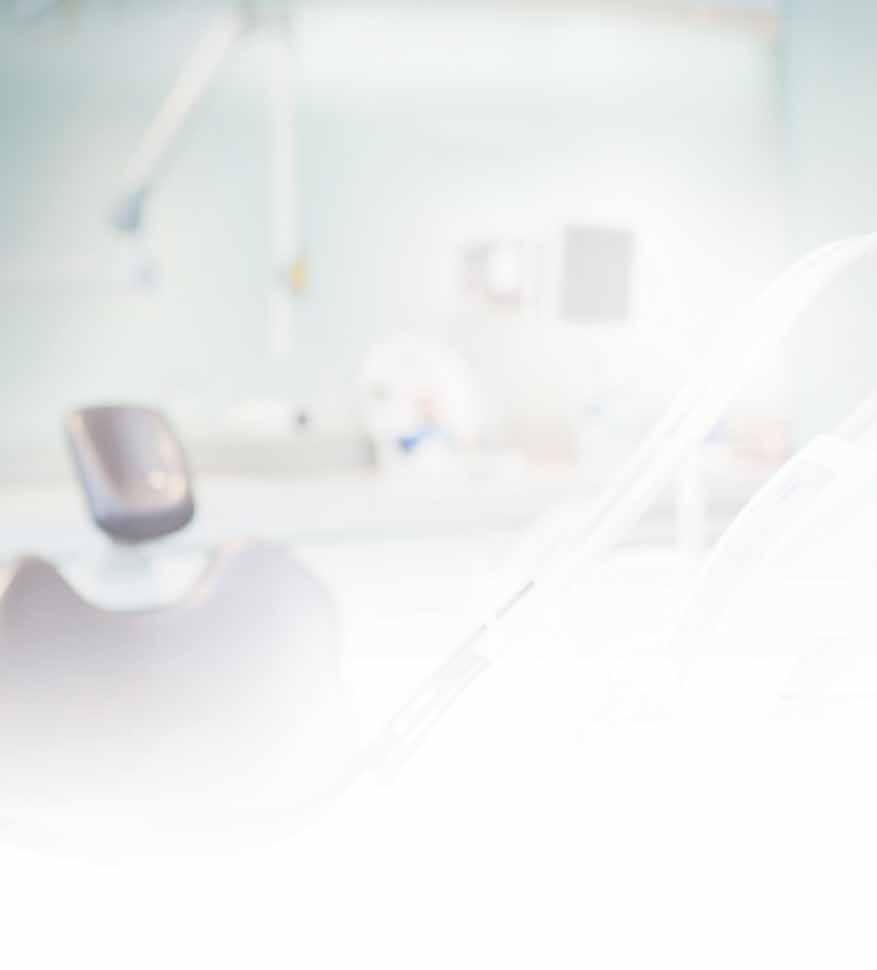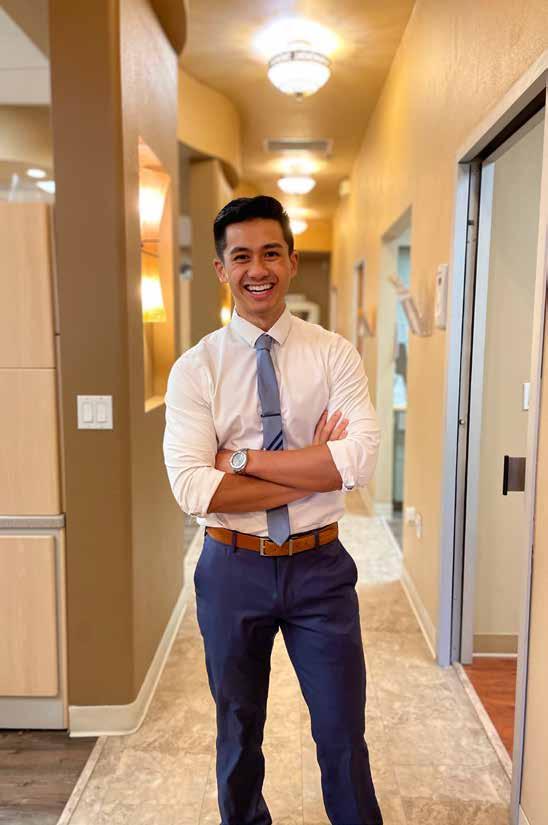
26 minute read
You Should Know
IMPORTANT REMINDER PAPERLESS RENEWAL - COMING TO THE DENTAL BOARD OF CALIFORNIA IN JULY 2021
Reprinted with permission from The Dental Board of California
Advertisement
To better serve our licensees with greater speed and accuracy, the Dental Board of California (Board) will convert to an online-only renewal process beginning with the July 2021 renewal cycle. Renewing online significantly reduces processing times: renewal transactions can be approved within 24 to 48 hours, compared to the current mail-in process, which can take up to 4 to 6 weeks. This will also reduce the Board’s carbon footprint, conserve natural resources, reduce mailing costs, and make the best use of licensee/permit renewal fees. As part of this transition, licensees/permit holders will no longer receive the current renewal notice by mail. Licensees/permit holders will instead be mailed a renewal reminder postcard approximately 90 days prior to their expiration date for each license or permit they hold. To aid licensees/permit holders in this transition, the Board recommends that licensees/permit holders that are not currently registered on the BreEZe system set up their account now to avoid any technological or account issues when renewing a license or permit near the expiration date. For information on setting up your BreEZe account and renewing online, please visit the BreEZe webpage at www.BreEZe.ca.gov. In addition to renewing online, you can apply for a new license or permit and make changes to your information, such as updating your mailing address or requesting a duplicate license. Until the transition, licensees can continue to renew online or by mail. If you have additional questions or concerns, please contact the Board at (916) 263-2300, or by email at dentalboard@dca.ca.gov.
REMINDER: CAL/OSHA POSTING REQUIREMENT FEBRUARY 1ST!
Reprinted with permission from California Employers Association Every year, from February 1 – April 30, most employers are required to post Cal/OSHA Form 300A in a conspicuous place where you normally post employee posters. It's that time again, and after April 30th, the form may be taken down but must be kept on file for 5 years.
WE ARE PUSHING OUT ALL COVID-19 VACCINE
INFO WE GET VIA EMAIL - MAKE SURE YOU ARE RECEIVING OUR EMAILS
MEMBER BENEFIT
All primary offices should have received a free copy of the 2021 Employment Law Poster in February. Additional posters are available for sale through SDDS for $24.95 (member price).
Don't throw it away! Unfortunately, we will have to charge you for a replacement.
MEMBER BENEFIT
DON'T GET SCAMMED
Reprinted with permission from The Dental Board of California Licensees continue to report being victimized by scam callers claiming to represent the Dental Board of California (Board) or another government agency. The Board has learned that scam artists posing as Board staff are calling California licensees as part of an attempted fraud scheme. The callers identify themselves as Board staff members or investigators, notify the licensee that they are under investigation for drug trafficking by the Board and other entities including local police, the Drug Enforcement Agency (DEA), and/or the FBI, and demand money. The callers may be “spoofing” the Board’s telephone numbers to make the calls appear to be coming from the Board. Board staff members or investigators will never contact licensees demanding money or payment of any form without conducting an official investigation or inquiry. If you receive such a call, please refuse the demand for payment. Please also consider the following: • If you receive a call, contact the Board directly at (877) 729-7789 or (916) 2632300, or via email to Dentalboard@dca. ca.gov to inquire if an official investigation is being conducted. • If the caller is stating they are from DEA, report the scam using the DEA’s Extortion
Scam online reporting form. • If the phone number of the caller appears to be the Board telephone number, it is recommended that you submit an online complaint with the Federal
Communications Commissions (FCC) using the FCC’s Consumer Complaint form or contacting the Board, so it can provide the information to the FCC. • Do not disclose any personal information, i.e. social security numbers, date of births, or credit / debit card numbers.
Nugget:
Do you have family members that are dentists?
with Dr. Chris Macasaet
By Chris Macasaet, DDS
SDDS Member
Dr. Macasaet went to dental school at the University of the Pacific Arthur A. Dugoni School of Dentistry in San Francisco, California. He also attended a General Practice Residency at St. Barnabas Hospital in Bronx, New York. Currently Dr. Macasaet practices with his father at their two private practices, Calvine Family Dental in Elk Grove and Aloha Family Dental in El Dorado Hills, California.
Dr. Macasaet:
I come from a long line of dentists. My grandfather is a prosthodontist and my grandmother is an orthodontist. My father, aunt, and cousin are all dentists and my younger sister is currently in dental school. My grandfather on my father’s side, the prosthodontist, was the dean of the dental school at the University of the Philippines. He later taught at Georgetown University when they had a dental school.
Nugget:
Those are big shoes to fill. So why did your father leave an established family practice and move to the United States?
Dr. Macasaet:
My dad could have easily stepped into his parent’s practice but he wanted a better life for his children. The Philippines was not the best place to raise a family and was fairly corrupt. He thought that it would be better to move to America and start a new life and raise a family here. He knew it would be hard because he didn’t have a lot of money but it worked out very well.
Nugget:
You grew up in Sacramento, California and a week after graduating from the Arthur Dugoni School of Dentistry in San Francisco in 2019 you entered a one-year residency in Bronx, New York. Why did you choose this residency in New York?
Dr. Macasaet:
The reason I went there is I am very interested in surgery. St. Barnabas Hospital is in the Bronx, New York and is a level one trauma center. Since I was the dental surgery resident on-call, I would see all of the trauma from the neck on up. I sutured numerous faces during my time there. The residency was like the television show “Grey’s Anatomy” and during my on-call days, I would have to spend the night at the hospital. Another reason why I went to New York, was that I lived in California my entire life and I wanted to see the other side of the country before I settled down in Sacramento.
Nugget:
Are you considering a residency program in Oral and Maxillofacial Surgery?
Dr. Macasaet:
I haven’t decided yet. Oral Surgery training in California would be nice.
Nugget:
After the general practice residency ended in mid 2020, where have you been working?
Dr. Macasaet:
I am currently working at my family’s two private practices: Calvine Family Dental Care in Elk Grove and Aloha Family Dental Care in El Dorado Hills. Generally, I work anywhere from four to six days a week. With the holidays and more people wanting to squeeze in appointments, we've been working five to six days which is pretty busy.
Nugget:
Dr. Macasaet:
It is more difficult than I thought it would be to balance life and my professional career, especially when I am running my own practice. Dentistry is time consuming, and I care deeply about my patients, which makes it even more difficult to leave work at the office. Two habits that have helped are waking up early to read a few pages of a good book with my morning coffee, and at night focus on going to the gym and getting my blood flowing after a hard day's work. I make sure to reserve most of the weekend to pure leisure.
Nugget:
Are you content with your choice of careers?
Dr. Macasaet:
Ultimately, yes. Ever since I was a child, I would play in my father’s practice daily, and he would introduce me to his staff and patients. My dad would then proudly say, “My son is going to be a dentist!”. The setback, here, is when one states someone else is going to be something or someone in the future, it may push that person in the opposite direction, which is how my story started. Growing up, I sought any profession other than dentistry. At the start of college, I shadowed architects, bioengineers, artists, and surgeons, but these professions somehow did not check off all my boxes. When considering a profession, I composed a list of fundamentals that would comprise my dream profession. Undoubtedly, having an artistic and building component made it to the top of my list. From the moment I could hold a pencil, I would spend hours engulfed in a drawing with a smile on my face. My friends and family saw the pure bliss in my eyes when I gazed upon one of my completed creations. The second component, a profession containing a social aspect, was crucial since I love interacting with people, building friendships, and listening to another person’s stories and experiences. Lastly, a component that lets me give back to others through a manner of health. The reason for this last component is I was an athlete in my younger years with a fascination for biology and science. In hopes of me still pursuing dentistry, my father asked me to shadow his friend from dental school who became an oral surgeon, I agreed. Shadowing this surgeon changed my view on dentistry and he was everything I envisioned myself to become. Ever since then, I knew dentistry was the perfect fit for me.
Dr. Macasaet:
No, I don’t enjoy dentistry, I love dentistry. I love seeing before and after photos of my work and how my work has impacted the oral health, smile, and confidence of my patients. My favorite part about dentistry is how each and every day, I can build new connections with my patients and have them join my dental family.
Hello
Dr. Deanna Lee
By Deanna Lee, DDS Dr. Lee graduated from University of the Pacific Arthur A. Dugoni School of Dentistry in 2016. Post-graduation, she completed a 12-month residency in Advanced Education in General Dentistry at Davis, California. She currently practices at ChapaDe Indian Health in Auburn, California.
Nugget:
Currently you are working at Chapa-De Indian Health in Auburn, California. How did you get your current job?
Dr. Lee:
My father had told me about Chapa-De Indian Health. I found on their website that they had an opening for a full-time general dentist. I immediately applied for the job and they responded right away. At the time that I applied for the job, I was still waiting for my dental license. I obtained my dental license by completing the one-year Advanced Education in General Dentistry residency. I was lucky to receive my dental license much more quickly than I had anticipated so I was able to start working at Chapa-De in September 2017, just two months after my residency program ended.
Nugget:
What would be your ideal work environment: group practice, solo practice, public health or some other situation?
Dr. Lee:
My ideal work environment is in public health. In fact, I see myself working in public health for the rest of my dental career. I absolutely love working in public health because I am able to help so many people who desperately need dental care. I find that my job can be very hectic and stressful at times but I find it even more rewarding. I also love that I can go to work, do my job, and then go home and not worry about managing the office. I recently became a homeowner and I plan on getting married and raising children in the future, so I think I will be able to balance my work and personal life better if I do not need to manage a dental practice. I also chose to not be in solo practice because it is so expensive to go through dental school and then to buy a practice. I recall that some of my classmates from dental school graduated with half a million in debt! I was fortunate to not have that much in loans but I would be very concerned about paying off that amount in loans, all the while buying and managing a practice.
Nugget:
Dr. Lee:
The new COVID requirements were initially difficult to adjust to mainly because the requirements were constantly changing. Our office has always been efficient about having enough Personal Protective Equipment but now there are more rules that we have to follow. Our clinic, like so many others, have been having difficulty obtaining N95 masks that properly fit our staff. We received a large number of donated N95 masks but we found that many of our staff do not pass the fit test with the donated masks. We also have a very large clinic that consists of medical, dental, optometry, diabetes, and behavioral health departments, so we need much more PPE than other small clinics or dental practices. To help alleviate the N95 shortage, our clinic was able to obtain a large number of Power Air Purifying Respirator units and we have also been using extraoral suction units to collect aerosols created from procedures. We have also needed to reduce the number of patients we see to maintain social distancing requirements in our waiting rooms.
Nugget:
What are your current challenges?
Dr. Lee:
Our current challenges are mostly concerning PPE shortages and being able to adapt to the constantly changing COVID requirements. We have been able to increase the number of patients we see and we have finally returned to being able to do all types of dental procedures, but in turn it has also increased the physical and mental strain on the staff. I have heard from many of our Registered Dental Assistants who are wearing the PAPR units that the units are physically taxing because they are heavy and bulky, especially when worn constantly during a full day of work. For me personally, I am glad that we are slowly returning back to our normal schedules, but there is always that fear of being infected with COVID. I have drastically decreased the amount of inperson interaction I have with my family and friends due to the fear of spreading COVID to the people I care most about.
Nugget:
Have you been able to meet your financial obligations?
Dr. Lee:
Our clinic was temporarily open for emergency services only when COVID started to get worse in March 2020. Each of our clinics in Auburn and Grass Valley had only one dentist and one RDA, so the rest of the dental staff were on furlough during April and May. A small number of the staff, myself included, were able to return to work in early June 2020. I am fortunate that my work was able to compensate half of my usual salary during the two months of furlough, but it did put some financial strain on me. I became a homeowner in February 2020, so I was initially concerned about paying for my new mortgage on top of my school loans and other financial responsibilities. Overall, though, I was able to meet all of my financial obligations.
Nugget:
Dr. Lee:
For me, it is very easy to balance my personal life and my professional career. Like I mentioned above, I enjoy working in public health because I am not managing a dental practice and I have more time and energy to fulfill my personal goals and obligations. Based on what I have observed and heard from colleagues and friends, I believe it would be very challenging to balance personal and professional lives while owning a dental practice because there are so many challenges to owning one. It has become very expensive to own and to run a practice, all the while promoting it responsibly on social media and keeping up with all the rules and regulations, especially in California.
Nugget:
Do you enjoy dentistry?
Dr. Lee:
I absolutely enjoy dentistry and I cannot imagine myself in any other career!
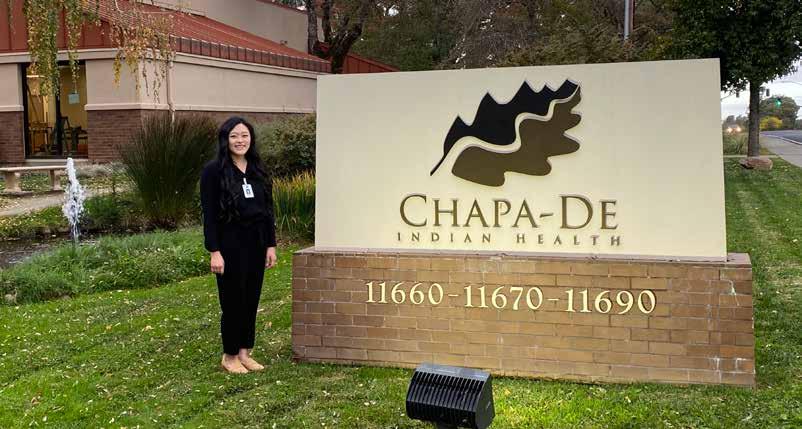
By Jonathan Lee, DDS
OCDS Member
Dr. Lee graduated from University of California, San Francisco, School of Dentistry, Class of 2019. He then attended University of California, Los Angeles - Venice, Advanced Education in General Dentistry 20192020. Dr. Lee is currently practicing in Southern California.
MEET
Dr. Jonathan Lee
Nugget:
Your father is Sacramento District Dental Society member Gordon Q. Lee, DDS who has been practicing in Sacramento, California for decades. Your path to a dental career was circuitous. Where did you go for your undergraduate education?
Dr. Lee:
I went to University of California, Los Angeles for undergrad. I studied material science engineering, electronic materials option. I was curious about the way things worked, and dentistry wasn't really on my radar. All throughout undergrad I wanted to build things and see what I could do, engineering wise. I'm kind of a careerchanger. I went back to school after a six year engineering career.
Nugget:
Was it difficult to go back to school?
Dr. Lee:
I resigned from a successful engineering career in August 2012 with no guarantee that I would get into dental school. I enrolled in a full-time post baccalaureate program at San Francisco State University in September 2012. I did that to take more upper division science classes and prerequisites, to show that I could still do well academic wise. I started at University of California, San Francisco School of Dentistry in the fall of 2015. It was quite a journey.
Nugget:
Were you the oldest in your dental class?
Dr. Lee:
I was not. I was amongst the oldest.
Nugget:
And after graduating from UCSF, what did you do?
Dr. Lee:
I graduated from UCSF in 2019 and ended up doing an Advanced Education in General Dentistry at University of California, Los Angeles Venice Dental Center. I finished that at the end of August 2020. I planned to go straight to work right after finishing dental school, but the dental offices where I received offers had specific procedures I was allowed to do. I was a little more interested in trying to expand my abilities, so I decided to do the residency.
Nugget:
You finished your residency in August 2020. Where are you working now?
Dr. Lee:
I'm working at a private practice, a couple days a week. and I'm also working at a community clinic, a federally qualified health center, a couple days a week.
Nugget:
What are demographics of the community clinic?
Dr. Lee:
Most of the patients are Korean speaking. I don't really speak that much Korean. Luckily, one of the dental assistants is fluent in Korean. The younger patients speak English and Korean. We’re also working on a multiethnic collaborative of community agencies to do mobile dentistry for underserved
communities. We're going to see some Spanish speaking patients and also a few Cambodian groups and some Chinese patients.
Nugget:
Dr. Lee:
Not too much. I have a few more years of life experience, than maybe a typical graduate. I have learned that things kind of work themselves out over time. It feels like I'm dating myself here. I noticed that some people just fresh out of school are really in a hurry to do all these things. But everything you might want to get done actually takes much longer than what you anticipated. I think if you keep moving forward, and you keep making progress, you'll see your results at the end.
Nugget:
Okay, so this is a personal question which you don't have to answer it. But, as old dentists, we are concerned for you guys financially. Have you been able to keep up financially?
Dr. Lee:
I've been doing it wisely. I'm not quite where I want to be at by any means. Luckily, I have support from my wife. And, I didn't have as many loans as everybody else. I feel for my friends that are still in school and have a huge amount of loans. I think that puts people in a position to accept a job that maybe isn't ideal for them. I feel somewhat fortunate that I'm non-traditional.
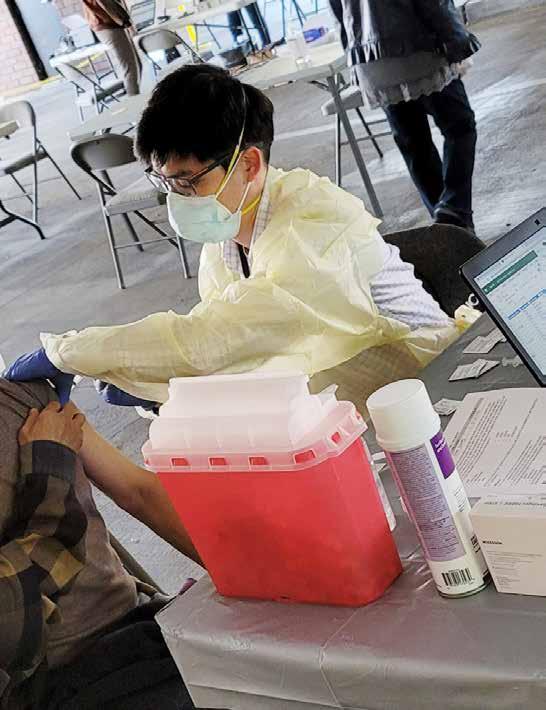
Nugget:
What do you see yourself doing in ten years?
Dr. Lee:
I have a lot of ideas, but definitely I want to own something. I don't know if I want to have a solo practice or find a group practice with a few other people who have a similar practice style on how to best treat the patients. I do want to somehow stick with public health. There’s a need, and I'm not quite sure how to fill that or help combat that. The other idea was to go into a type of dental entrepreneurship to integrate technology with new developments, maybe like data or digital something. That’s kind of out there, a bunch of wild ideas.
Nugget:
But it's good to have wild ideas. When else are you going to have that?
Dr. Lee:
I'm glad I have those ideas, and still have the flexibility to do things. So, we'll see…
Q+A with
Dr. Elizabeth Bingham
By Elizabeth Bingham, DMD
SDDS Member
Originally from the East coast, Dr. Bingham graduated from Tufts University School of Dental Medicine in 2015. Upon graduation she completed a General Practice Residency at Yale New Haven Hospital. She currently practices in Davis, California. Her husband is Ramesh Thondapu, DMD.
Nugget:
Where did you grow up?
Dr. Bingham:
I grew up in North Salem, a small town about an hour north of New York City. It was surprisingly rural there given its proximity to the city!
Nugget:
How did you become interested in dentistry?
Dr. Bingham:
I always loved working with my hands, and particularly loved painting, drawing and building things. Additionally, I wanted to go into healthcare from a very young age. Dentistry seemed like the perfect marriage of these interests.
Nugget:
Where did you go for your undergraduate degree and what did you major in?
Dr. Bingham:
I went to Williams College, a small school in northwestern Massachusetts. I majored in Psychology and obtained a certificate in the Russian Language.
Nugget:
Where did you go for dental school and do you have any postgraduate education and degrees?
Dr. Bingham:
I went to Tufts University – and met my partner there! I completed a one-year hospital-based General Practice Residency at Yale-New Haven Hospital.
Nugget:
Do you think your dental school prepared you for the level of skill that is needed?
Dr. Bingham:
Absolutely. Tufts excelled at clinical preparation, and I felt that our instructors were all very dedicated to helping us succeed. Additionally, I believe I gained the most confidence in my clinical and patient management skills in residency.
Nugget:
What areas are you interested in increasing your proficiency?
Dr. Bingham:
I am interested in learning more about occlusion and management of the worn dentition. I had the privilege of working with a dentist back East who had done a lot of work with the Dawson Academy. I want always to practice dentistry in harmony with the temporomandibular joint.
Nugget:
What is your source for continuing education?
Dr. Bingham:
Pre-COVID I enjoyed going to the American Academy of Cosmetic Dentistry convention yearly. They have excellent options for continuing education, including classroomstyle hands-on courses with wonderful instructors and lecturers. I just always find I get a lot out of it.
Nugget:
What was your first job out of dental school?
Dr. Bingham:
After residency I took an associateship at a small family practice in New Hampshire. Dr. Jim Predmore did high-quality dentistry and full-mouth rehabilitation with an emphasis on occlusion. I learned so much during our time together, and he was an excellent mentor.
Nugget:
Where are you working now and how did you get your current job?
Dr. Bingham:
I am working at a well-established family practice in Davis. I’ve been here for three years and I love coming to work each day. When we moved to Davis my strategy for finding work consisted of: searching for dentists in the area, picking a few that look friendly on their websites, and sending an email with my resume. I didn’t look at any advertisements. I felt very lucky that Dr. Howard Shempp, our practice owner, felt it was time to hire an associate and took a chance on me.
Nugget:
Do you have some news that you would like to share?
Dr. Bingham:
Yes, I do have some exciting news to share. I am currently transitioning to practice ownership. Dr. Shempp will be retiring this April, after more than forty wonderful years of dentistry in Davis. I have big shoes to fill, and am looking forward to the challenge!
Nugget:
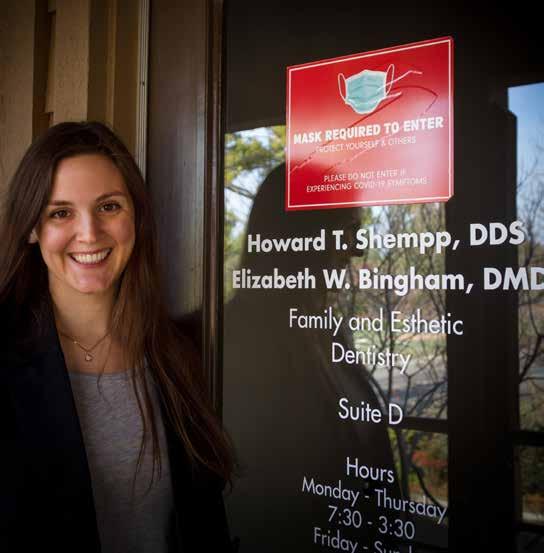
Dr. Bingham:
A little, but ultimately in a profession that’s as high risk as dentistry, these precautions we take are necessary and appreciated. I’ve learned new ways to balance lots of PPE on my ears or the back of my head. Procedures take more time and there are more considerations in the way we seat patients or dress ourselves.
Nugget:
What are your current challenges?
Dr. Bingham:
I believe one of the biggest challenge dentists are facing, and especially young dentists, is the consolidation and corporatization of our profession. Before the pandemic, we made the difficult but absolutely necessary decision at our practice to no longer contract with any insurance companies. This was the only sustainable option for us. Dentists and patients are both being asked by large corporations to do more with less money. Especially as we emerge from this pandemic, the economic repercussions are going to be vast and severe for a lot of people, and this is something I’m very worried about in terms of access to affordable dental care.
Nugget:
Dr. Bingham:
My partner and I don’t have kids yet, and we’re privileged that we’re not working paycheckto-paycheck. Currently, balancing our lives and professional careers is not particularly challenging, but I imagine that with more familial responsibilities this could change.
Nugget:
Do you enjoy dentistry?
Dr. Bingham:
I do! What I enjoy less, again, is the involvement of large for-profit corporations in healthcare. I am grateful to be in a smalltown practice which allows me to develop a sense of community and provide high quality patient care.
MEET
Dr. Ramesh Thondapu
By Ramesh Thondapu, DMD
SDDS Member
Dr. Thondapu earned his dental degree from Tufts University in 2014 and his endodontics certificate from Tufts in 2016. He lives in Davis and is currently practicing endodontics in Roseville, Davis and Fairfield. His wife is Elizabeth Bingham, DMD.
Nugget:
Your wife, Dr. Elizabeth Bingham, mentioned that you grew up in Merced, California. Where did you receive your dental education?
Dr. Thondapu:
Yes, I grew up in Merced! I graduated from Tufts University School of Dental Medicine, Boston, Massachusetts. I also did a residency there and hold an Endodontic Certificate.
Nugget:
Where are you currently practicing?
Dr. Thondapu:
I am currently practicing in three separate private endodontic offices. I am with Creekside Endodontics in Roseville. I practice with Dr. Stephen Holifield in Fairfield, and I practice with Dr. Steven Penn in Davis.
Nugget:
While at Tufts Dental School, you participated in microbiology research and presented your findings to the American Dental Association and the American Association for Dental Research.
Dr. Thondapu:
Yes, I appreciate the science behind endodontics and dentistry in general. Microbiology, and more specifically biofilm, has been my number one passion in dentistry.
Nugget:
You graduated from Tufts University with cum laude distinction and received recognition for Clinical Excellence in Endodontics. In addition, you were invited into the Omicron Kappa Upsilon Honor Society. These are impressive awards!
Dr. Thondapu:
I enjoy the process of learning and worked very hard in school. I’m lucky the results showed.
Nugget:
How was the endodontic residency?
Dr. Thondapu:
The experience overall was quite good. As with any institution there were pros and cons. But what I liked was that Tufts gave us early clinical exposure and we were
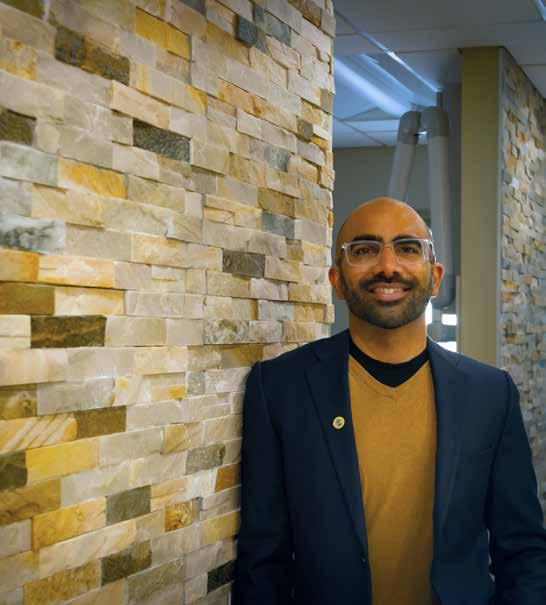
encouraged to get as much experience as we could. We had a larger class (seven residents per year) which I enjoyed. A lot of programs had two or three residents but this gave us an opportunity to get to know a wider range of people and learn from each other. I made some really good friends in the process. I don't think, retrospectively, I would have gone anywhere else.
Nugget:
You have been out of endodontic residency now for five years, what are the worries of your specialty?
Dr. Thondapu:
Endodontics is a high stress environment as most patients present with acute pain. But it’s also rewarding to have the ability to relieve that pain. It's a difficult field and it can be tough getting people to understand why we exist as a specialty and how complicated root anatomy is. But I love when I get good outcomes. I'm pretty passionate when I choose something to pursue and I love endodontics.
Nugget:
What are your current challenges?
Dr. Thondapu:
At this point, being almost five years out of residency I’m most frustrated with not being able to practice one hundred per cent the way I want to practice. Additionally, a major insurance company is reducing reimbursements while our treatment costs are rising. This doesn’t bode well for dentists who deliberately try to do slower-paced, high-quality work. I’m concerned about the long-term effects of the pandemic on the economy. I’m also concerned about the consolidation of private dental offices by giant corporations. Our generation has paid a lot to get through school. Now we are facing a huge life decision between taking on more debt to acquire practices or working for big dental service organizations. It’s sad to watch the death of small businesses.
Nugget:
Passion for dentistry seems to be a major mantra for all of the five dentists presented in this issue. What is your impetus for this passion of dentistry?
Dr. Thondapu:
Bacteria! Biofilms are incredibly resistant, diverse structures akin to cities. We are all at war with bacteria every day in caries, periodontal disease, endodontic pathology. I’m excited about technology we have to combat these processes. Our generation of endodontists trained on dental surgical microscopes and cone beam computed tomography. We also now have an irrigation device that allows us to irrigate super efficiently and help disrupt these biofilms to a much greater extent than ever before. These are things that stimulate my passion for dentistry and keep our field moving forward. There are a lot of really good endodontists. I can name many in this area alone, but what I think sets me apart is my philosophy of addressing the problems that endodontists face. What do endodontists not like to admit? And, how can we improve those things?
Nugget:
I tried calling all the recent graduates on the list the Sacramento District Dental Society gave me. You and the other dentists in the issue all responded how you love dentistry. It is so wonderful to hear.
Dr. Thondapu:
I’m so glad to hear that but in terms of who responds to your calls I think it’s a selfselecting process. I can tell you that there are definitely people my age who are not happy in the field. Unfortunately, you won’t hear from them because they don’t want to talk about dentistry.






